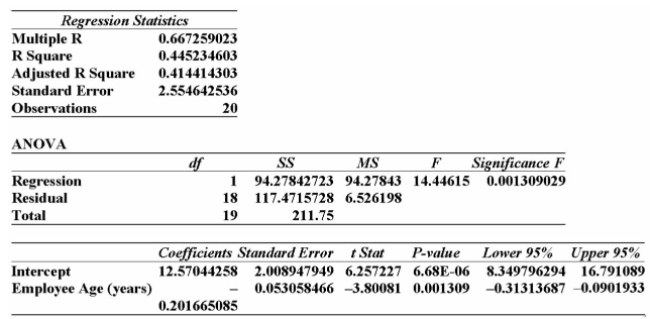Multiple Choice
Information was collected from employee records to determine whether there is an association
Between an employee's age and the number or workdays they miss. Excel results are summarized
Below: 
From this printout you determine:
A) when tested at the 2% level of significance, there is no relationship between an employee's age and the number of days of work absences.
B) for each additional year of age, we can expect the number of days of absence to decrease by 0.2 days.
C) almost 67% of the variation in the number of absent days can be explained by the variation in the employee's ages.
D) when tested at the 2% level of significance, there is relationship between an employee's age and the number of days of work absences. For each additional year of age, we can
Expect the number of days of absence to decrease by 0.2 days.
E) when tested at the 2% level of significance, there is no relationship between an employee's age and the number of days of work absences. Almost 67% of the variation in
Correct Answer:

Verified
Correct Answer:
Verified
Q1: If the decision in the hypothesis test
Q2: The partial megastat output below is regression
Q4: i. The basic question in testing the
Q5: The partial MegaStat output below is regression
Q6: Information was collected from employee records to
Q8: When comparing the 95% confidence and prediction
Q9: i. In order to visualize the form
Q10: i. A t test is used to
Q11: i. The coefficient of correlation is a
Q161: Which of the following is true about